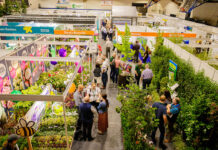Boyd Douglas-Davies, PR, Communication and Plants Director at the family-run group was invited to represent British Garden Centres and set out the challenges that the retail horticulture sector is facing. Boyd addressed the Lords Horticulture inquiry about garden retail and the worker shortage, the impending peat legislation and how net zero will affect the industry.
 Boyd highlighted to those present how vital the horticultural industry was, contributing £ 29 billion to the UK economy in 2019, and forecasted to grow to approximately £42 billion in 2030. “The value of horticulture to our world is worth far more than just money,” Boyd said. “It also has vital benefits to our environmental policies and its’ value to our health and wellbeing is beyond measure. This is what we should be talking about beyond the pound value.”
Boyd highlighted to those present how vital the horticultural industry was, contributing £ 29 billion to the UK economy in 2019, and forecasted to grow to approximately £42 billion in 2030. “The value of horticulture to our world is worth far more than just money,” Boyd said. “It also has vital benefits to our environmental policies and its’ value to our health and wellbeing is beyond measure. This is what we should be talking about beyond the pound value.”
British Garden Centres’ operation is 30% plant offering with other departments at each store there to ensure year-round employment. The diverse offering of British Garden Centres often brings customers to a horticultural establishment for the first time, where they discover plants and broaden the marketplace. Only 3% of British Garden Centres workforce are seasonal workers, the rest are in permanent employment” Boyd explained
The biggest single challenge to the industry is the proposed 2026 government peat legislation. “This has stopped our investment plan whilst the threat of the 2026 peat ban is in place.” said, Boyd. “The scale of the issue is based around our knowledge that out of the 8 million plants, 51% are grown in the UK and 49% in Europe and none of the nurseries in Europe are far on the peat-free journey. British growers are away ahead of everyone else so bringing in a peat ban in 2026 would put us at risk of being 4 million plants short. There simply is not enough production in the UK to satisfy what we need as a company, let alone the rest of the industry. This could mean a lack of plants in spring 2027 and then what happens? ”
Boyd also went on to address the committee outlining how Post-Brexit plant import paperwork had cost an additional £15,000 per week. Plants waiting to be inspected on lorries can spend 24-48 hours in the dark which is not good for their health and puts biosecurity at risk.
The Horticultural Sector Committee invites the public, particularly those working in the industry to provide their views on the future of the sector as part of its inquiry. Topics of discussion include the challenges, opportunities and risks faced by the horticultural sector, including the impact of rising input costs and labour and skills shortages and the impact of climate change on productivity.
Jack Ward (British Grower Association, Mike Norris (Newey Group/West Sussex Growers Association), Ali Capper (National Farmers Union), George Hillier (Hillier’s Garden Centres and Nurseries), and Jo Lambell (Beards and Daisies) also spoke at the event.
“This year-long special inquiry is a fantastic opportunity to showcase our sector’s challenges and opportunities to parliament and wider policymakers. Boyd’s evidence was impactful in setting out the here-and-now and longer-term asks that are common to our sector – whether that be a feasible and sustainable peat deadline or the impact of trade disruption on industry growth potential. We thank Boyd and other HTA members for contributing to the evidence-building for the sector and delivering the experience of British horticulture business to parliament,” said Jennifer Pheasey, Director of Public Affairs, at the Horticultural Trades Association who was also present at the meeting.









